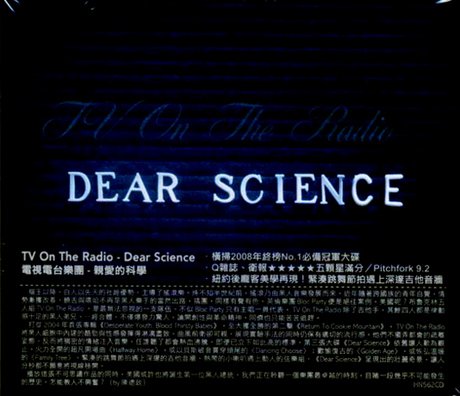
TV on the Radio
Dear Science,
Release Date: Sep 23, 2008
Genre(s): Rock
Record label: DGC/Interscope
Music Critic Score
How the Music Critic Score works
Album Review: Dear Science, by TV on the Radio
Excellent, Based on 10 Critics
Based on rating 5/5
New York's TV On the Radio used to make difficult music that was easier to admire than to like. However, their fourth album seems to answer the conundrum of how to make experimental music popular. Led by guitarist/production wizkid David Sitek, Dear Science comes laden with awkward drums, avant jazz squawks, the hum of electric pylons and what at one point sounds like the whirr of a recorded hedge trimmer.
Based on rating 9.0/10
Despite releasing some of this decade’s most anthemic songs (like “Staring at the Sun” and “Wolf Like Me”), TV on the Radio haven’t delivered a cohesive, album-long accomplishment. Sure, Return to Cookie Mountain was a work of a quality we don’t see much of these days, but “Wolf Like Me” stole the show at track five and never gave it back. And Desperate Youth, Bloody Thirsty Babes was too scattered for its own good.
Based on rating 9/10
As Dear Science, unfolds, it becomes clear that it isn't so much a radical change for TV on the Radio as it is a slight but significant shift in approach. "Stork and Owl," an inspired mix of hypnotically looping samples and flowing, real-time soulfulness, and "Love Dog," which boasts some of Adepimbe's most affecting singing since "Staring at the Sun," could have fit easily on earlier albums with a few sonic tweaks. And, like Desperate Youth, Bloodthirsty Babes and Return to Cookie Mountain, Dear Science, begins with an epic statement of purpose -- although "Halfway Home" is as sleek as it is grand, sprinting towards its end with streaking guitars -- and ends in an embrace with "Lover's Day," a duet with Celebration's Katrina Ford that turns "I wanna break your back" from a threat to a come-on.
Based on rating 4.5/5
Review Summary: Funky, soulful, poppy but not without considerable weight, Dear Science is one of 2008's best.A friend of mine likes to tell me that I have a habit of, as he calls it, "killing flies with a sledgehammer". And I won't deny it. My opinions tend to pick up steam and gain momentum, and as a result I end up convincing myself of things that just aren't true.
Based on rating A-
The Strokes and the Yeah Yeah Yeahs, ?fellow downtown luminaries alongside Brooklyn quintet TV on the Radio in the early aughts, ? blew the NYC scene wide open, thanks to their immediate hooks, fashion-flashpoint looks, ? and straightforward rock nomenclature. TVOTR, however, have stayed willfully weird, ? refusing to commercialize the sound they created some seven years ago. Even as they made the leap to a ? major label with their 2006 sophomore outing, Return to Cookie Mountain, the band’s stew of soul-punk, avant doo-wop, and percussive Sturm und Drang remained frequently challenging, even abrasive.
Based on rating 4/5
The most engaging film characters have likeable qualities that conflict with something that's inherently hard to stomach. Brooklyn's TV on the Radio masterfully employ this tension in Dear Science, - apparently their major breakthrough album. Similar to their two previous records, it has little rejoicing lyrically; it's mostly unease and disaffected sentiment.
Based on rating 4/5
It might be the gleeful 'ba-ba, ba ba ba' chant, or the insistent On the Corner handclaps, or the brazenly uplifting bass hum, or the vocals which swagger confidently between the stateliest of croons and the most histrionic falsetto. But before this album's exultant opening number 'Halfway Home' is even 50 per cent finished, something tells you that TV on the Radio have at last made the transition from perennial up-and-comers to a band who have got to a place somewhere near where they ought to be. There are several possible explanations for this New York quintet's sudden shift up a gear, among them the imminent demolition of producer/multi-instrumentalist Dave Sitek's Brooklyn studio, and the emergence of a new generation of off-kilter local heroes who would rather view them as a shining example than a cautionary tale.
Based on rating 7.3/10
Brooklyn art-rock troupe experiments to mixed resultsHow strange that, in these times fraught with war, economic recession, poor housing markets and all kinds of bad news, TV on the Radio sounds more party-ready than ever. With a few notable exceptions (“New Health Rock,” “Wolf Like Me” and original breakout “Staring at the Sun”) scattered across its catalog, the innovative Brooklyn quintet has most often opted for the meditative over the motivational, the somber over the sensational. Not that there’s anything wrong with that.
Based on rating 5/10
I don’t know what I expected from the new TVOR album, but one thing I certainly didn’t expect was to end up bored by it. Here was one of the most sonically innovative bands working within a pop context (I refer to pop in its most expansive definition), experimenting and at the same time broadening their appeal on their second full length album, and promising on the third to become even more user friendly. I’m not a big fan of esoteric noodling without any entertainment value so I was definitely ready to accept such a move, even though I’ve been a big fan of what they’ve done up to now.
Opinion: Very Good
On 2006's Return to Cookie Mountain, TV on the Radio sounded frustrated, but they also found a way over the wall of reverb that populated their earlier albums with the single "Wolf Like Me. " On third full-length Dear Science, the Brooklynites have turned a corner, safe in the knowledge they can pen a good pop song. Not everything works, of course: "Crying" floats by undetected, and "Red Dress" feels forced in its funk.

